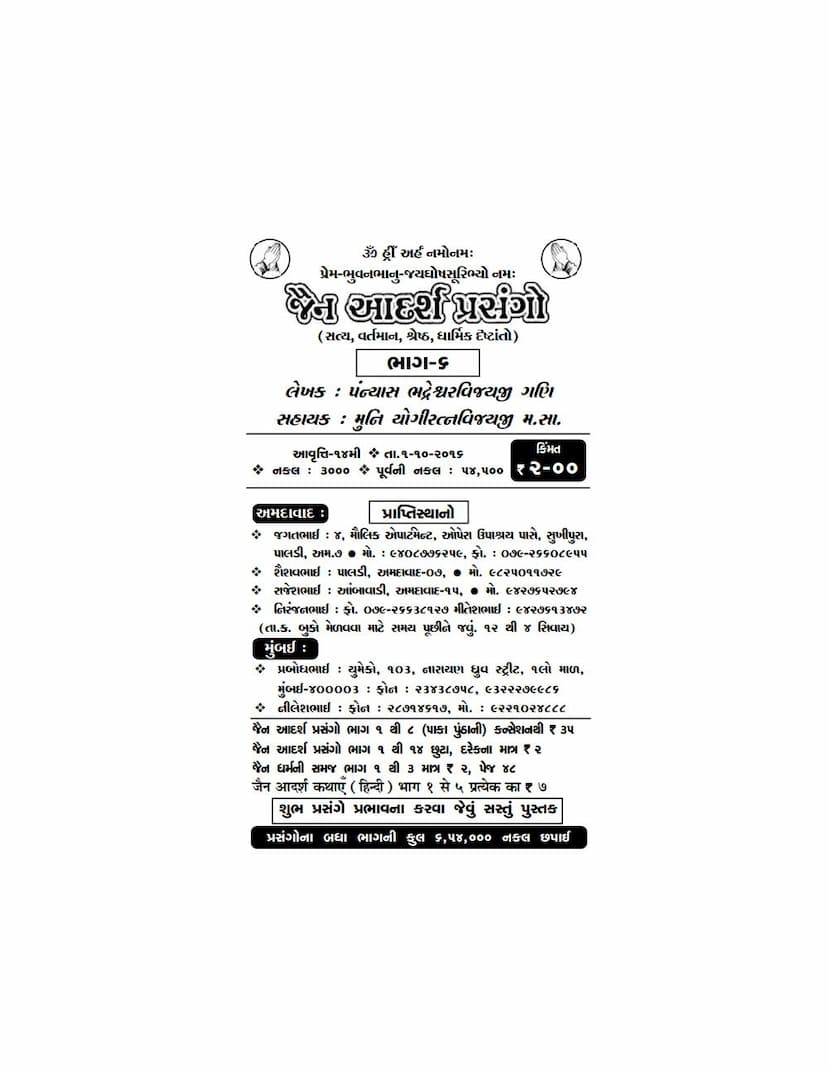Jain Adarsh Prasango Part 06
Added to library: September 1, 2025

Summary
This is a comprehensive summary of "Jain Adarsh Prasango Part 06" by Bhadreshwarvijay, based on the provided text:
Book Overview:
"Jain Adarsh Prasango Part 06" (Ideal Jain Incidents, Part 06) is a collection of inspiring stories and exemplary conduct of Jain individuals, highlighting their adherence to religious principles and ethical values. The book aims to educate and motivate readers to cultivate virtues like honesty, compassion, devotion, and adherence to Jain tenets. It is published by Bhadreshwarvijay and is part of a larger series, with significant previous print runs indicating its popularity.
Key Themes and Content:
The book is structured into several main sections, each containing numerous individual anecdotes. The primary themes explored include:
-
Honesty and Integrity (પ્રમાણિકતા):
- A government engineer refuses a bribe of ₹50,000 for certifying a faulty bridge construction, prioritizing his ethical principles over financial gain, despite personal difficulties.
- A priest, despite earning a living, felt guilt over taking a salary for serving God and prayed for the ability to return it, which he eventually did after his son became successful.
- A shopkeeper (Maganbhai) insists on finding a customer who was overcharged a mere half-anna (a small coin), demonstrating extreme honesty even in minor transactions. He even performed ayambil (a fast) for three days due to the accidental overcharge by his son.
- A rickshaw puller finds a bag with ₹10,000 and returns it to the police, refusing a reward, showcasing his integrity even in financial hardship.
- A young man promptly repays a loan, refusing his mother's suggestion to delay it to earn interest, emphasizing the importance of fulfilling obligations.
-
Devotion and Faith (પ્રભુભક્તિ, સંઘભક્તિ):
- A priest who desired to serve God without salary eventually returned all his earned salary when his financial needs were met by his son.
- A Sangh Pramukh (leader of the Jain community) calmly responds to criticism by stating he serves the trust as if it were his father's, because it is God's, who is everyone's father.
- A devotee (Haribhai) undertakes to facilitate the pilgrimage for about 125 people. Despite facing difficulties with train reservations, his strong faith leads to unexpected help from a railway officer, enabling the pilgrimage.
- A devout follower (Prabhudas) allows an elderly mother, who wished to perform the first puja at Shatrunjay but couldn't due to her son's financial limitations, to perform it using his purchased thali.
- A textile merchant (Chandmal Baradia) goes to great lengths to ensure flowers are available for pushpa puja (flower worship) at temples, even hiring an extra person to deliver them. He also dedicated a portion of his building for a temple.
- A devotee (Jashwant) who recovered from a skin disease through puja and prayers eventually took diksha (renunciation) after praying to be saved from marriage.
- A businesswoman (Jintmati) battling breast cancer found relief and improvement through chanting mantras and using snatrajal (purified water) as prescribed by a spiritual guide.
-
Compassion and Non-violence (કરુણા, જીવદયા, અહિંસા):
- A young woman refuses marriage because the groom's family consumes root vegetables, fearing the sin of harming countless living beings daily.
- A follower (Babubhai) organizes the rescue of 1300 pigs from being culled by the municipality, demonstrating immense compassion for animals.
- A college student (Rajan) avoids dissecting frogs for an exam by praying and taking advantage of a power outage, then presenting a dissected frog from another student.
- A businessman stops his business during the monsoon season to avoid harming insects that thrive in the moist conditions of his product (oil cakes).
- A butcher, influenced by a discourse, renounces his violent profession and receives financial support to start a new livelihood.
- A devotee (Chimmanlal) regularly buys animals from butchers to save them, showing extraordinary love for living beings.
- A woman prioritizes her religious vows over household comfort, refusing to drink water from her son's home in Mumbai because they have no restrictions on night meals.
-
Adherence to Principles (નીતિનો દૃઢ આગ્રહ, પ્રતિજ્ઞા):
- A government officer's wife values integrity more than material wealth like diamond bangles, preferring the "priceless jewelry" of adhering to Jain principles.
- A young man (Rajan) who was a carefree college student eventually took diksha after attending lectures, performing samayik (meditation), and receiving inspiration from his spiritual teacher.
- A businessman (Kumarpal V. Shah) vows to practice celibacy for life if a severe storm subsides within ten minutes, and it does, leading him to a life of religious service.
-
The Power of Jain Teachings (જિનશાસન, જિનવાણી):
- The book emphasizes the transformative power of listening to pravachans (discourses). A chain-smoker quits his habit after hearing the ill effects of smoking explained by a spiritual leader.
- A businessman (Dharmaruchi) dedicates himself to religious practices after attending lectures, including drinking only boiled water, reducing clothing use to minimize violence, and giving up his business entirely.
- A man named Devendrabhai, initially indifferent to religion, becomes a devout follower after hearing a discourse, leading to his commitment to daily religious practices.
-
Importance of Rituals and Practices:
- The book highlights various forms of aradhana (worship/practice) such as bhaktamar stotra, chaityavandan, upvas (fasting), ayambil, and pratikraman.
- It stresses the significance of community worship, like the collective Bhaktamar recitation, and the dedication of devotees who participate regularly.
- The text also points out the merit in performing loach (offering food to monks/nuns) with devotion and care.
Overall Message:
"Jain Adarsh Prasango Part 06" serves as a guide and inspiration for Jains, demonstrating that with strong faith, determination, and adherence to the teachings of the Tirthankaras, one can overcome personal challenges, uphold righteousness, and achieve spiritual well-being. The stories aim to instill a deeper appreciation for Jain principles and encourage readers to actively incorporate them into their daily lives.